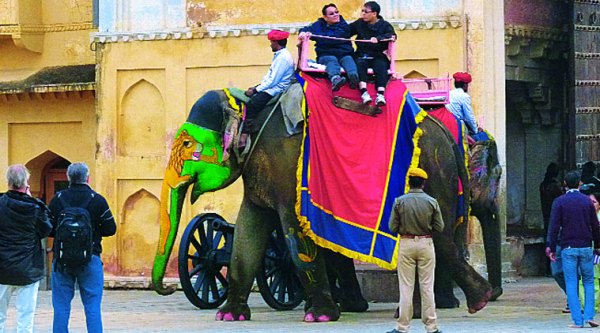Elephants can remember: How we reduce the mighty beast to subservience
That elephants obey our commands — how that bloats our egos, and helps us forget the pain and distress inflicted during the “training” process, on what is essentially a peace-loving beast.
 Elephant (Source: Ranjit Lal)
Elephant (Source: Ranjit Lal)
I’ve never been able to figure them out. In the jungles, they are the most feared creatures of all, with a reputation for being unpredictable and liable to charge without notice. Despite their enormous bulk, they move as silently as apparitions, appearing and disappearing like smoke.
Amongst themselves, they are said to be intelligent, caring, family-minded and gentle (except for males in musth with a 60X aggro factor). They grieve their departed, stay in touch over long distances by low frequency rumbling and foot stomping, take exemplary care of their babies. Families are led by renowned old matriarchs who have seen it all before. And they remember.
When wild herds come in contact with us, the results are usually not pleasant for anyone. Crop fields are pillaged, huts flattened, people trampled — and the elephants are driven away (from what was originally their own stamping grounds) with sticks, stones and firecrackers, and, sometimes, gunfire.
All said and done, it is best to stay as far away as possible from wild elephants — you have no chance against five tons of screaming rage heading your way at 30 mph. Yet they do not look violent or threatening, as say the big cats do. No bowel-loosening snarls, no four-inch canines, no merciless gimlet eyes pinning you down: Just that benign smile and friendly flapping of giant ears and a trunk reaching out to catch your scent.
Is that why we think we can make them do our bidding? And over thousands of years, have done so: from using them in wars to saddling them with golden howdahs, from hauling logs in the forest to pulling mighty chariots, from standing in hotel foyers, “saluting” guests to taking children for rides at the zoo, from making them balance on balls at the circus to leading cacophonic street processions decked up to the nines.
But really, there’s no more pathetic sight than an elephant sashaying down a city road in summer, its giant pads sizzling on hot tarmac and being assailed by that most intellectual of human sounds: the motor horn. Why do they stand for it? They can overturn a bus with a gentle nudge, yet, on they go, swaying their trunks gently, their little eyes blinking enigmatically. Sure, they’ve been trained to be accustomed to our racket — the Dussehra elephants are subject to the boom of cannon-fire for weeks before the festival, so they don’t freak out during the procession.
Is it the training they receive? Which, it is said, basically kills their spirit (that heavy, sharp ankh) so they cow down before this skinny shouting creature they can effortlessly pick up and toss across a football field. That elephants obey our commands — how that bloats our egos, and helps us forget the pain and distress inflicted during the “training” process, on what is essentially a peace-loving beast. But I’m still amazed that every “city” elephant doesn’t make a break for it or go berserk. Some do — and usually people die — but the animal pays. Is it fear that makes most of them take it, or just an infinite patience (which, would try a saint) or just hopelessness? I don’t know how true those recent reports were of that tusker ‘Raja’ in UP who allegedly “cried” with relief when he was rescued from his cruel owner. But if so, to have done stuff to make a grown tusker cry after being rescued — can we get any more bestial?
Ah, but how many million times have we done that to our own kind?
Ranjit Lal is an author, environmentalist and bird watcher
- 01
- 02
- 03
- 04
- 05


























